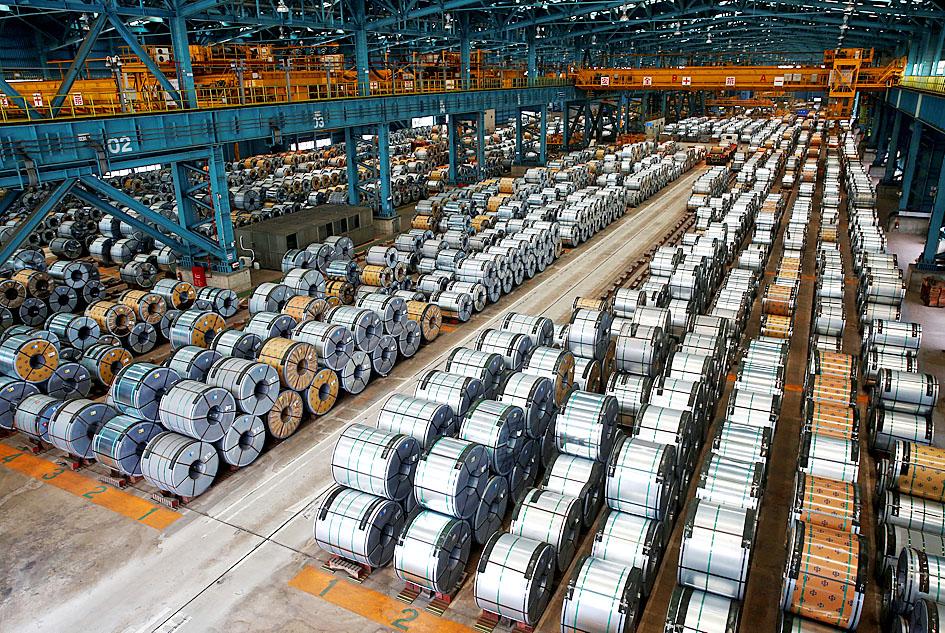China Steel Corp (中鋼), the nation’s largest steelmaker, yesterday said it is cutting its steel prices by about 1.62 percent for domestic deliveries next month in response to lower demand due to accumulated inventory, global port congestion and the appreciation of the New Taiwan dollar.
The adjustments mean that prices of hot-rolled sheets, hot-rolled coils and electro-galvanized coils would fall by NT$500 per tonne next month, while prices of cold-rolled coils would fall by NT$700 per tonne, the largest cut among all products, China Steel said.
The price of hot-dipped zinc-galvanized coils used for construction and home appliances would decrease by NT$500 per tonne, the company said.

Photo: Tyrone Siu, Reuters
The reductions follow an average downward adjustment of 2.15 percent for deliveries this month, which the company announced on Dec. 22, corporate data showed.
Weaker demand has affected steel exports and reduced its number of customers, prompting the price cuts, the company said in a statement.
“Global supply chain blockages have increased due to ongoing gridlock at ports worldwide, and inventory levels remains high,” the statement said. “Meanwhile, exports would not benefit from a strong NT dollar, which has appreciated to a 25-year high against the US dollar.”
The spread of the Omicron variant of SARS-CoV-2 also dampened demand, the Kaohsiung-based company said.
Its price-adjustment strategy is “appropriate and follows the trend,” the steelmaker said.
Despite cutting prices for the domestic market, China Steel holds an upbeat outlook for the global market, as demand from suppliers of petroleum steel pipe is likely to increase on the back of rising prices of crude oil and a growing number of oil fields, the company said.
However, global steel supply might fall as China continues to lower its steel output to meet its target of carbon neutrality, it said, adding that South Korea is also reducing its steel manufacturing to curb carbon emissions.
South Korea’s Pohang Iron and Steel Co last month terminated a furnace with a capacity of 1 million tonnes per year, China Steel said.
“Based on developments in global supply and demand, we think that, although steel prices are in a correction cycle after dropping from a peak last quarter, they will rebound after the Lunar New Year,” it said.
Luxembourg-based ArcelorMittal SA is to raise prices of some steel materials by 30 to 50 euros per tonne, China Steel said.
Steel prices have also increased in northern and southern Europe, it said.

In Italy’s storied gold-making hubs, jewelers are reworking their designs to trim gold content as they race to blunt the effect of record prices and appeal to shoppers watching their budgets. Gold prices hit a record high on Thursday, surging near US$5,600 an ounce, more than double a year ago as geopolitical concerns and jitters over trade pushed investors toward the safe-haven asset. The rally is putting undue pressure on small artisans as they face mounting demands from customers, including international brands, to produce cheaper items, from signature pieces to wedding rings, according to interviews with four independent jewelers in Italy’s main

Macronix International Co (旺宏), the world’s biggest NOR flash memory supplier, yesterday said it would spend NT$22 billion (US$699.1 million) on capacity expansion this year to increase its production of mid-to-low-density memory chips as the world’s major memorychip suppliers are phasing out the market. The company said its planned capital expenditures are about 11 times higher than the NT$1.8 billion it spent on new facilities and equipment last year. A majority of this year’s outlay would be allocated to step up capacity of multi-level cell (MLC) NAND flash memory chips, which are used in embedded multimedia cards (eMMC), a managed

Japanese Prime Minister Sanae Takaichi has talked up the benefits of a weaker yen in a campaign speech, adopting a tone at odds with her finance ministry, which has refused to rule out any options to counter excessive foreign exchange volatility. Takaichi later softened her stance, saying she did not have a preference for the yen’s direction. “People say the weak yen is bad right now, but for export industries, it’s a major opportunity,” Takaichi said on Saturday at a rally for Liberal Democratic Party candidate Daishiro Yamagiwa in Kanagawa Prefecture ahead of a snap election on Sunday. “Whether it’s selling food or

In the wake of strong global demand for AI applications, Taiwan’s export-oriented economy accelerated with the composite index of economic indicators flashing the first “red” light in December for one year, indicating the economy is in booming mode, the National Development Council (NDC) said yesterday. Moreover, the index of leading indicators, which gauges the potential state of the economy over the next six months, also moved higher in December amid growing optimism over the outlook, the NDC said. In December, the index of economic indicators rose one point from a month earlier to 38, at the lower end of the “red” light.